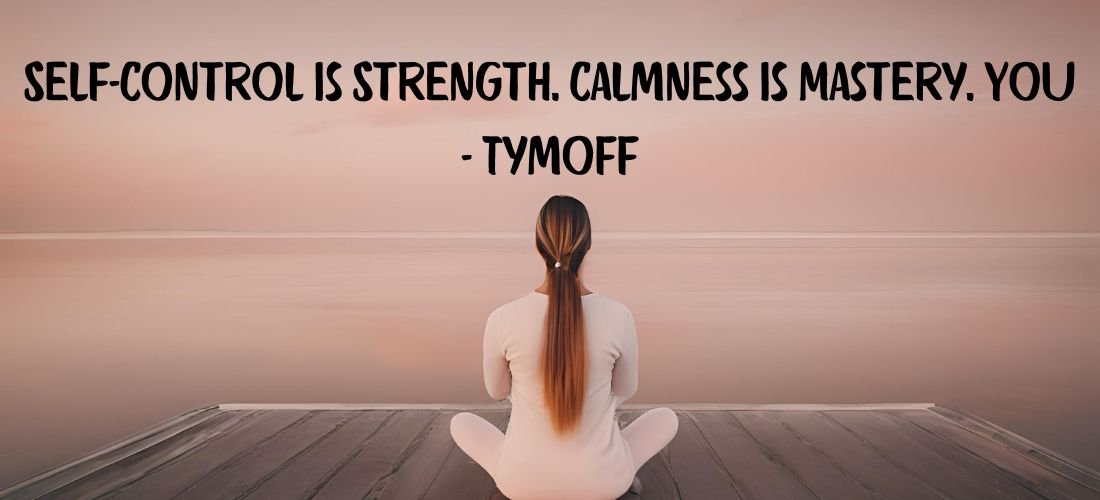In a world filled with constant noise and distractions, the pursuit of inner peace and control over one’s emotions has never been more relevant. The phrase “Self-control is strength. Calmness is mastery. You – Tymoff” captures this profound truth, resonating with many who seek to lead a balanced and fulfilling life. This article delves into the deeper meaning behind these words, exploring how self-control and calmness are essential qualities that can transform our lives.
What Does “Self-Control is Strength” Mean?
Self-control is the ability to regulate your thoughts, emotions, and actions, especially in challenging situations. It is a form of inner strength that allows you to resist temptations, stay focused on your goals, and maintain discipline even when faced with difficulties. In essence, self-control is about mastering your impulses and making decisions that align with your long-term values rather than short-term desires.
In practical terms, self-control can manifest in various aspects of life. Whether it’s resisting the urge to react impulsively in a heated argument, sticking to a diet, or maintaining a consistent work routine, self-control is the driving force that helps you stay on track.
Read Also: 128.199.175.251 IP address | Rs 149 Bear Design Long-Sleeve Baby Jumpsuit Thespark Shop
Why is Self-Control Considered Strength?
Self-control is often seen as a sign of strength because it requires immense willpower and discipline. It is easier to give in to immediate desires or emotions than to restrain oneself and think rationally. Those who possess self-control can navigate life’s challenges with resilience, making thoughtful decisions rather than being swayed by external pressures.
Moreover, self-control builds character. It teaches patience, perseverance, and the importance of delayed gratification. In a world where instant results are often glorified, the ability to exercise self-control sets individuals apart, allowing them to achieve lasting success and personal growth.
The Concept of “Calmness is Mastery”

Calmness, on the other hand, refers to the state of being peaceful and serene, even in the midst of chaos. It is the ability to maintain composure and clarity of mind when everything around you seems to be falling apart. Calmness is not about suppressing emotions but rather managing them in a way that keeps you centered and focused.
Mastery, in this context, refers to the complete control or dominance over something. Therefore, when we say “calmness is mastery,” we imply that achieving calmness is a form of mastery over oneself and one’s environment. It is the hallmark of a person who has learned to control their emotions, thoughts, and reactions, thereby maintaining inner peace regardless of external circumstances.
The Connection Between Calmness and Mastery
Calmness is often associated with wisdom and maturity. It reflects a deep understanding of oneself and the world, allowing an individual to respond to situations with a level head rather than reacting impulsively. This mastery over one’s emotions leads to better decision-making, improved relationships, and a more balanced life.
In essence, calmness is the foundation of mastery because it allows you to approach life’s challenges with a clear mind. When you are calm, you can think more rationally, assess situations more accurately, and take actions that are aligned with your long-term goals. This level of mastery is not about controlling others or external events but about mastering yourself.
“You – Tymoff”: Personal Responsibility and Growth
The phrase ends with “You – Tymoff,” which brings the focus back to the individual. It is a reminder that the journey towards self-control and calmness is a personal one. No one else can achieve this for you; it requires self-awareness, dedication, and continuous effort.
Tymoff is a platform that emphasizes personal growth, self-improvement, and the importance of taking responsibility for one’s life. The inclusion of “You” signifies that you are the architect of your destiny. Your ability to exercise self-control and maintain calmness is entirely within your power, and it is up to you to cultivate these qualities.
Practical Steps to Develop Self-Control
- Set Clear Goals: Having well-defined goals gives you a sense of purpose and direction, making it easier to exercise self-control. When you know what you’re working towards, you’re less likely to be distracted by short-term temptations.
- Practice Mindfulness: Mindfulness helps you stay present and aware of your thoughts and emotions. By practicing mindfulness, you can catch impulsive reactions before they take over, giving you the space to choose a more controlled response.
- Build Healthy Habits: Developing habits like regular exercise, a balanced diet, and sufficient sleep can strengthen your willpower and self-control. These habits create a foundation for maintaining discipline in other areas of life.
- Avoid Temptations: Create an environment that minimizes temptations. If you’re trying to stick to a diet, keep unhealthy snacks out of reach. If you need to focus on work, eliminate distractions from your workspace.
- Reflect on Your Progress: Regularly reflecting on your actions and progress helps reinforce your commitment to self-control. Celebrate small victories and learn from setbacks to keep yourself motivated.
Cultivating Calmness in Everyday Life
- Practice Deep Breathing: Deep breathing exercises can help calm your nervous system and reduce stress. Practicing deep breathing regularly can train your body to remain calm even in stressful situations.
- Adopt a Positive Mindset: Focusing on the positive aspects of life can help you stay calm and composed. By choosing to see the good in situations, you reduce the impact of stress and anxiety.
- Take Regular Breaks: Allow yourself to take breaks throughout the day to relax and recharge. Whether it’s a short walk, meditation, or simply sitting quietly, breaks can help you maintain calmness.
- Engage in Relaxing Activities: Activities like yoga, reading, or spending time in nature can promote relaxation and calmness. Incorporating these activities into your routine can help you manage stress more effectively.
- Let Go of What You Can’t Control: Accepting that some things are beyond your control can reduce anxiety and help you stay calm. Focus on what you can control—your thoughts, actions, and reactions.
The Role of Self-Control and Calmness in Success
Success in life often hinges on your ability to maintain self-control and calmness. These qualities enable you to navigate challenges, make informed decisions, and persevere in the face of adversity. Whether you’re pursuing personal goals, building relationships, or advancing in your career, self-control and calmness are invaluable assets.
People who master these qualities tend to be more resilient, adaptable, and capable of handling pressure. They are less likely to be swayed by external circumstances and more likely to stay focused on their long-term objectives. In a world that is often chaotic and unpredictable, the strength of self-control and the mastery of calmness provide a solid foundation for lasting success.
Read Also: How Ads.xemphimon@gmail.com is Revolutionizing Digital Advertising | UploadArticle.com
Conclusion
The phrase “Self-control is strength. Calmness is mastery. You – Tymoff” encapsulates the essence of personal growth and inner peace. By developing self-control, you build the strength to overcome challenges and stay true to your values. By cultivating calmness, you achieve mastery over your emotions and reactions, allowing you to navigate life with clarity and purpose. Ultimately, the responsibility for this journey lies with you, and the rewards are well worth the effort.
FAQs
1. What does “Self-control is strength” mean?
It means that self-control gives you the strength to resist temptations, stay focused on your goals, and make decisions that align with your long-term values.
2. Why is calmness considered mastery?
Calmness is considered mastery because it allows you to maintain composure and clarity of mind, leading to better decision-making and emotional control.
3. How can I develop self-control?
You can develop self-control by setting clear goals, practicing mindfulness, building healthy habits, avoiding temptations, and reflecting on your progress.
4. What are some ways to cultivate calmness?
Some ways to cultivate calmness include practicing deep breathing, adopting a positive mindset, taking regular breaks, engaging in relaxing activities, and letting go of what you can’t control.
5. Why is self-control important for success?
Self-control is important for success because it helps you stay disciplined, focused, and resilient in the face of challenges, enabling you to achieve your long-term goals.










